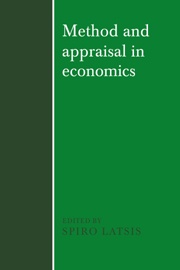Book contents
- Frontmatter
- Contents
- Preface
- A research programme in economics
- Economics and psychology: the death and resurrection of a research programme
- Schools, ‘revolutions’ and research programmes in economic theory
- Anomaly and the development of economics: the case of the Leontief paradox
- From substantive to procedural rationality
- Kuhn versus Lakatos or Paradigms versus research programmes in the history of economics
- On the history and philosophy of science and economics
- ‘Revolutions’ in economics
- Index
Kuhn versus Lakatos or Paradigms versus research programmes in the history of economics
Published online by Cambridge University Press: 23 November 2009
- Frontmatter
- Contents
- Preface
- A research programme in economics
- Economics and psychology: the death and resurrection of a research programme
- Schools, ‘revolutions’ and research programmes in economic theory
- Anomaly and the development of economics: the case of the Leontief paradox
- From substantive to procedural rationality
- Kuhn versus Lakatos or Paradigms versus research programmes in the history of economics
- On the history and philosophy of science and economics
- ‘Revolutions’ in economics
- Index
Summary
In the 1950s and 1960s economists learned their methodology from Popper. Not that many of them read Popper. Instead, they read Friedman and perhaps a few of them realised that Friedman is simply Popper-witha-twist applied to economics. To be sure, Friedman was criticised, but the ‘Essay on the Methodology of Positive Economics’ nevertheless survived to become the one article on methodology that virtually every economist has read at some stage in his career. The idea that unrealistic ‘assumptions’ are nothing to worry about provided the theory deduced from them culminates in falsifiable predictions carried conviction to economists long inclined by habit and tradition to take a purely instrumentalist view of their subject.
All that is almost ancient history, however. The new wave is not Popper's ‘falsifiability’ but Kuhn's ‘paradigms’. Again it is unlikely that many economists have read The Structure of Scientific Revolutions, but that is neither here nor there. Nevertheless, appeal to paradigmatic reasoning has quickly become a regular feature of controversies in economics and ‘paradigm’ is now the by-word of every historian of economic thought. Recently, however, some commentators have expressed misgivings about Kuhnian methodology applied to economics, throwing doubt in particular on the view that ‘scientific revolutions’ characterise the history of economic thought. With these doubts I heartily concur.
- Type
- Chapter
- Information
- Method and Appraisal in Economics , pp. 149 - 180Publisher: Cambridge University PressPrint publication year: 1976
- 47
- Cited by



